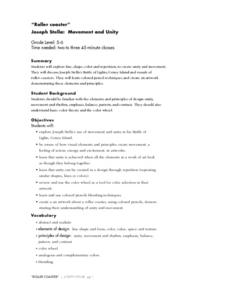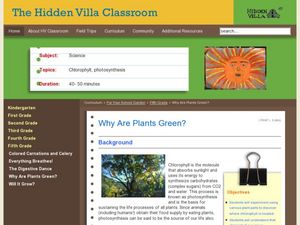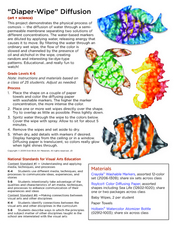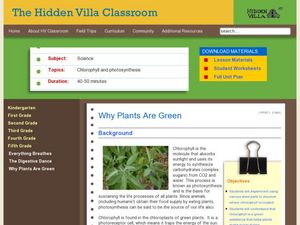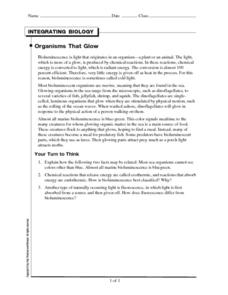Curated OER
Is Your Blue Really Blue? [Metamerism]
Students learn fundamentals about color perception, and explain the phenomenon called "metamerism". Students learn the three basic components of color perception: light source, illuminated colored object, and the light detector.
Curated OER
Star Wars Activity
Students investigate radiant energy by completing discrepant events and identify various temperature changes through absorption and how radiant energy can be used for solar panels. They experiment with different color fabrics in order...
Curated OER
Stained Glass Heart Sun Catcher
Students experiment with the effects of color and light as they are exposed to the basics of working with stained glass: cutting, assembly, soldering and finishing.
Curated OER
Elmer's Glue Crew
Learners practice cleaning up the environment by identifying wasteful behaviors in their school. In this arts and crafts lesson, students create "eco-inspector" binoculars using Elmer's glue, plastic wrap, and construction paper....
Curated OER
How Hot Is It?
Sixth graders use paper cups, black and white lining, thermometers and plastic wrap to conduct an experiment that measures the energy-collecting capacity of various colors. They graph the results.
Curated OER
Colored H2 Balloon Explosions
Students perform an experiment in which they put different types of salts in a balloon, fill it with hydrogen gas, and ignite it. The electrons in the salt molecules are excited by the heat and release energy in the form of light. ...
Curated OER
Flame Test
Students conduct a flame test on different substances. In this chemistry lesson, students predict the element present based on the color emitted during the flame test. They explain how different elements produce different colors.
Curated OER
Joseph Stella: Movement and Unity
Students explore line,shape,color and repetition,to create unity and movement. They discuss Joseph Stella's Battle of Lights, Coney Island and visuals of roller coasters. They use colored pencil techniques and create an artwork.
Sunlight Cal-Tech
Chromatography of Plant Pigments
Through a hands-on activity, an acetone-spinach solution is pre-made and learners use this solution to separate the pigments found in spinach using chromatography. The comprehensive resource includes an analysis and conclusion questions.
Curated OER
Atomic Theory
An extremely thorough presentation walks new chemists through the basics of matter. There really isn't a unifying theme, however So many topics are covered: forces, elements, atomic structure, chemical properties, compounds, quarks,...
Curated OER
Leaves and Photosynthesis
In this science worksheet, students read detailed information about green plants and the photosynthesis process. In this fill in the blank and true and false worksheet, students answer twelve questions.
Curated OER
Chemical Sleuthing
Students engage in a lesson which includes flame tests and the construction of a simple diffraction spectrograph with which to measure sodium ion emissions. They use the Bragg equation to compute the wavelength of the line spectra produced.
Center Science Education
Looking Into Surface Albedo
How does the color of a surface affect the heating of the earth? Middle school science classes experiment with color and surface albedo to determine the relationship. The website has tabs for an overview, teacher's instructions,...
Curated OER
Hot, Hot, Hot, Cold
Learners dance the image of falling snow. They move, swing, fall, and rise to music working to depict snow falling, the sun, and high/low movements. This is a well-thought out lesson that aids them in seeing movement as a form of...
Curated OER
Fast Fact-Finding
Ever wonder why the sky changes color so often? Readers examine an informational excerpt from John Farndon's How the Earth Works. They underline key points as they read and then answer five response questions. Prompts review main points,...
National Nanotechnology Infrastructure Network
Powers of Ten with the Blue Morpho Butterfly
Explore the powers of ten while examining a Blue Morpho butterfly wing. Learners discover there is a lot more than meets the eye when one looks close enough.
Curated OER
Rooftop Gardens
Second graders investigate how to help a city building remain cooler on the inside. They create a rooftop garden in order to shield the building and lower the internal temperature. The garden is meant to replace the black tar paper that...
Virginia Department of Education
Atomic Structure: Elements
It's all relevant, really. Individuals use the scientific method to learn more about elements, atoms, and their placement on the periodic table. They conduct experiments using materials common in nature to explore how elements affect our...
Curated OER
Photosynthesis
This relatively short PowerPoint contains all of the information necessary to give a clear summary of Photosynthesis. There are a few illustrations and clear descriptions of each stage of the main reactions.
Curated OER
Why Are Plants Green?
Students smash plant parts and wait for visibility of chlorophyl to show why plants turn green. In this green plants lesson plan, students use acetone and filter paper for this experiment.
Curated OER
Diaper-Wipe Diffusion
Explore osmosis through art. Learners use paper towels and markers to create beautiful designs. Although a simple activity, the results are quite remarkable. Your class will love this lesson!
Curated OER
Why Plants Are Green
Students discover the properties of chlorophyll in plants. In this plant biology lesson, students conduct an experiment to find where the chlorophyll in the plant is located. Students are split into small groups and study plant parts....
Curated OER
Organisms that Glow
In this bioluminescence worksheet, students read about various organisms that glow on land and in the sea. They answer three critical thinking questions after reading about these chemical reactions.
Curated OER
Plant Pigments
Students investigate the components of chlorophyll. They use paper chromatography to separate the many pigments of chlorophyll from one another.


![Is Your Blue Really Blue? [Metamerism] Lesson Plan Is Your Blue Really Blue? [Metamerism] Lesson Plan](http://content.lessonplanet.com/resources/thumbnails/94747/large/bwluav9tywdpy2symde4mtixny0zmdywos1smnd6dxauanbn.jpg?1545052463)






